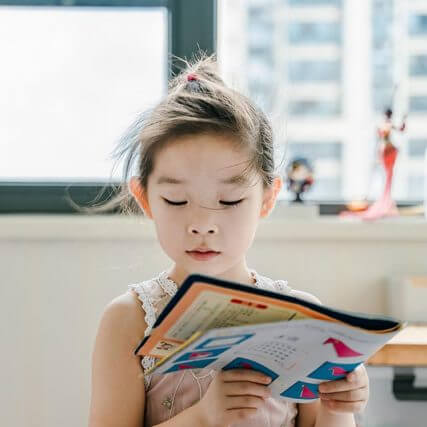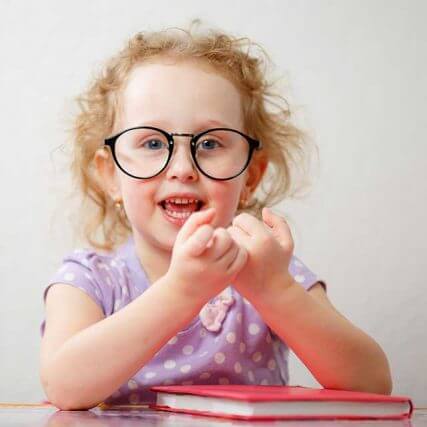Vision and School Success | Children's Eye Doctors Near Me
As much as 80 % of what a child learns in school is acquired through vision. If vision problems go undetected, children can be misdiagnosed with “learning difficulties” or “ADHD”, as is already the case in much of the world.
However, if a child undergoes a comprehensive eye exam, and vision complications are detected early in life, it is often possible to treat them effectively, leading to far fewer problems down the line.
Don’t wait until your children are already in school and struggling to read, see the board, or play sports. At Premier Eyecare of Cranberry, Inc, we have the clinical knowledge and expertise to identify vision issues early on and intervene before the problems affect different areas of your children’s lives.


School Vision Screenings vs. Comprehensive Eye Exams for Children
Typically, pediatrician or school vision screenings check your child’s eyes for basic aberrations or abnormalities. But to ensure good vision and proper eye health development, a comprehensive eye exam by a pediatric optometrist is required.
Comprehensive eye evaluations are crucial in revealing potential vision problems, which can interfere with kids’ learning development. This exam includes tests for binocularity, refractive error, color vision, acuity, and overall eye health.
What is Assessed During a Pediatric Eye Exam?
The Premier Eyecare of Cranberry, Inc optometrist will perform a thorough internal and external eye health evaluation. He or she will use specialized, age-appropriate instruments, testing procedures, and technologies that provide accurate results independent of your child’s response.
Your child’s vision-related learning skills will be assessed by evaluating the following:
- Eye Focusing
- Depth Perception
- Color Perception
- Eye Tracking
- Eye Muscle Teaming
- Peripheral Awareness
- Near Visual Acuity
- Distance Visual Acuity
How Often Should a Child Have an Eye Exam?
Children should have their first comprehensive eye exam at 6 months of age.
Following that, they should have their eyes examined at age 3 and at around age 5.
For school-aged children who don’t require correction, an eye exam every two years is recommended. Whereas children who need eyeglasses or contact lenses should be examined annually or as recommended by your optometrist.


Glasses for Kids
Should your child need glasses for vision correction, Premier Eyecare of Cranberry, Inc has a wide variety of age-appropriate and safe options. Because we specialize in eye care for young patients, we’re well acquainted with their preferred styles, shapes, and colors. We carry a large range of frames for children, inspired by adult trends but with a fun and imaginative approach and a pediatric fit in mind.
All of our frames are comfortable, durable, and made with kid-friendly materials. Young children find the bright colored frames they love, while teens find the latest fashion trends scaled down to fit their faces.
Do your kids play sports?
Athletic eyewear for children can help protect their young eyes from sports injuries.
At Premier Eyecare of Cranberry, Inc, we have something for every child and teen, no matter their preferences.
Contact Lenses for Teens
Contact lenses may be a good option for teens who frequently play sports or are concerned with how they look, and they’re at an age when they can adequately care for their lenses.
Contact Lenses Q&A with Dr. Joseph A. Terravecchia
Q. At what age do you recommend children start with contact lenses?
A. As an optometrist, I believe that contact lenses can be worn at any age. But contacts are a privilege and not a right. There is a financial responsibility associated with contact lens wear, as well as the need for overall accountability to avoid eye health issues. Therefore, for young people, I recommend that we wait to try contacts until both the patient and parents are on board.
In my experience, if the patient is not wanting contact lenses he/she will not take care of them appropriately and/or will not be successful at handling the lenses. On the flip side, the parent(s) need to agree to assume the financial responsibility of fit, follow up, and materials; also, they must agree that their child is mature enough to take care of the contacts on his/her own.
Do you have specific questions about fitting your child with glasses or contacts? Contact Dr. Joseph A. Terravecchia at Premier Eyecare of Cranberry, Inc, and we’ll be happy to assist.


Your Child Deserves the Best Eye Care
Premier Eyecare of Cranberry, Inc pediatric optometry division is a source of pride for our practice. Our experienced team works diligently to ensure that infants, children and teens have the ability to see, perceive and experience the world to their highest potential.
Make pediatric eye exams a priority. Don’t wait until your child faces issues at school or in other areas of life – contact Premier Eyecare of Cranberry, Inc now. Visit us for a routine comprehensive pediatric eye exam, or come to us with your concerns regarding your infant or toddler’s vision, and we’ll make sure to find the optimal solution for his or her visual problems. Let us bring great eye health and vision care to you and your family for many years to come.
Premier Eyecare of Cranberry, Inc serves patients from in, and around Cranberry Township, Pennsylvania.


